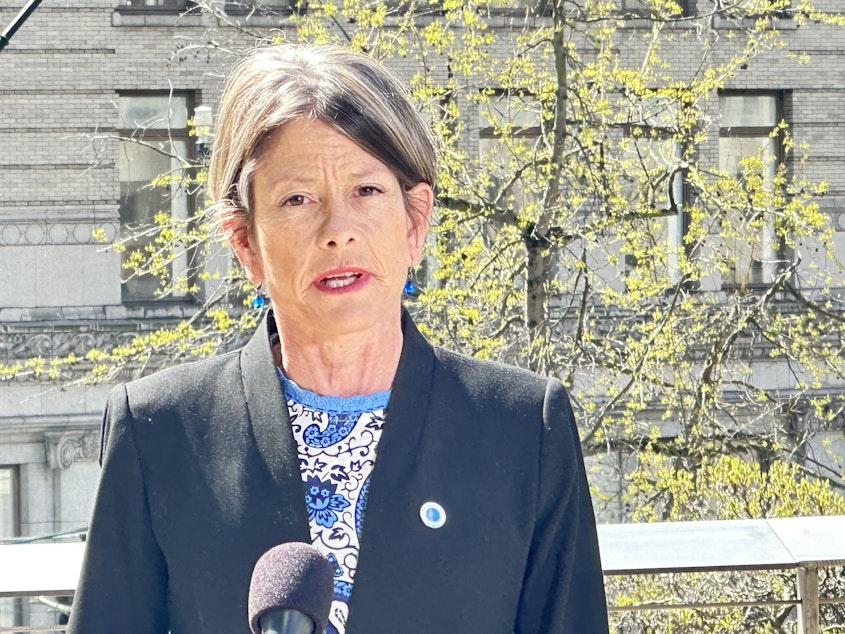Seattle has a new City Council. What will change in a year?

Seattle City Hall has a different vibe these days. The appointment of Tanya Woo to the City Council adds another hand on the wheel, pulling the city into the center lane and away from the previous Council's path.
With new leadership and a new direction, what will change around Seattle over the next year?
For starters, the Council will start working together, Council President Sara Nelson told KUOW's Week in Review on Friday. But beyond that, Nelson says the Council is primed to address what she sees as an interconnected web of challenges — police staffing, revitalizing downtown, public safety, transit, budgeting, and more.
RELATED: New-look Seattle City Council backs new president in unanimous vote
"I think in a year, you will see more officers at SPD, and people circulating more on buses and light rail — that is a prediction I will put forward," she said.
The question about what will change in Seattle was the first of many that Nelson tackled from the Week in Review panel, hosted by Bill Radke. The panel included Seattle Channel’s Brian Callanan, political analyst Joni Balter, and KUOW’s David Hyde.
Nelson said that she's hearing from Seattle's employers and workers that they would go downtown more often if they felt safe at bus stops and on transit.
"I chair the economic development (committee) still, so we need to bring more business downtown, more people on the street, and everything rests on the foundation of improved public safety," Nelson said.
To tax or to cut? That is the question
If there is one theme among Nelson's answers for all these issues, it's that the new council is likely to start asking questions about how the city does business. That means potential cuts to programs, and shifting how money is spent. For example, Nelson argues that Seattle is short on police officers, but hires new recruits slowly.
"What's the matter? We got about 2,000 applications to be an officer and our rate of hiring is really low, it's lower than the national average per application. Why is that?" she asked. "Now, council with a public safety chair, who really cares about public safety, and a whole council that knows they have to deliver to the voters, now we are able to ask and get into the details. That will make a difference."
RELATED: Political shakeup at Seattle City Hall for Council's Central Staff
Nelson is more interested in finding cuts and changes around city hall before even entering into a discussion about new taxes.
"We have a spending problem, not a revenue problem," she said. "We have got to focus on core responsibilities. We take an oath to protect the health, safety, and well being of our constituents. Those police positions are already funded, but the mayor has said in his direction that we are not going to touch public safety, and he has some tiered cuts in other departments."
Nelson added that she wants the city to be mindful of small businesses and not touch any programs that promote economic activity and generate revenue.
"What are we going to do? Are we going to fire anybody? No," Nelson said. "So we really have to try to pay attention to what is working, what isn't, protect the workers, and I admit, it's going to be some hard choices."
Nelson's stance that the city should consider making changes inside city hall, instead of pursuing new taxes, echoes what new Councilmember Tanya Woo recently told KUOW. Woo said that additional taxes "should be a last resort" for Seattle, and that the city should look for redundancies and "come up with measurements for success, so that we are results-based, before we actually go into progressive revenue."
Week In Review's panel also brought up: Seattle's drug laws and whether arrests can help with the local drug crisis; former King County Sheriff Sue Rahr recently told KUOW that the "Defund the Police" movement didn't harm police recruiting as much as poor public sentiment has; and Councilmember Tammy Morales, who ran against Tanya Woo in the general election, said that the Council's recent appointment of Woo on the dais was more about big business feeling it can call the shots in the city. Council President Nelson had a few things to say about each of those topics and more.
Listen to the full episode of Week in Review here. or watch the video below.
RELATED: Why is it so hard to hire and keep cops in Seattle?

